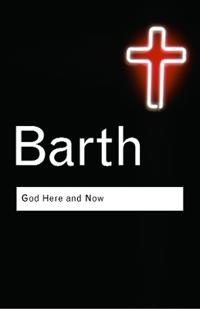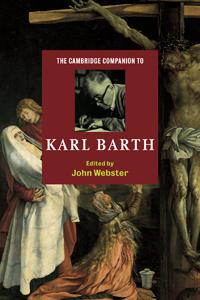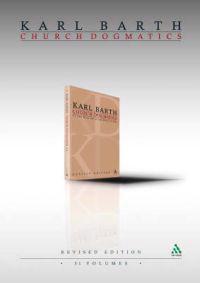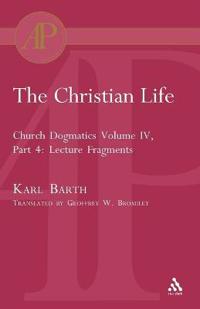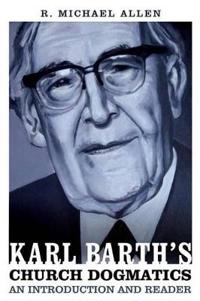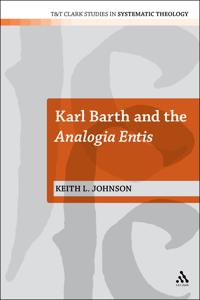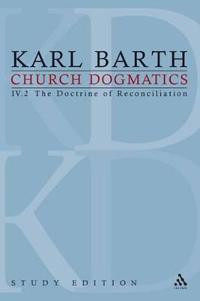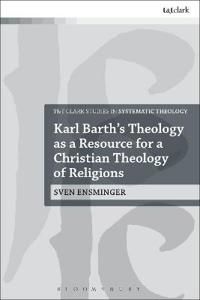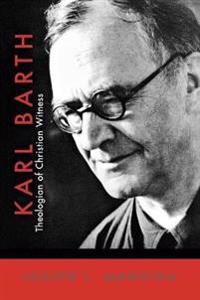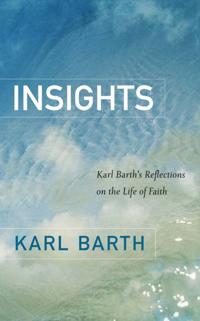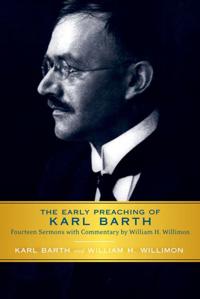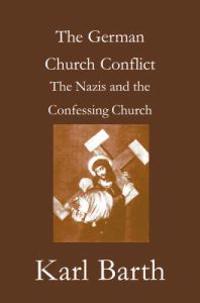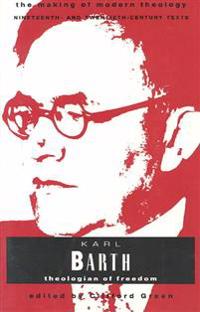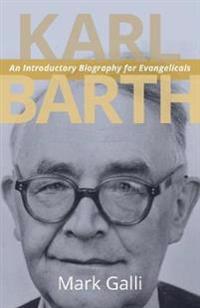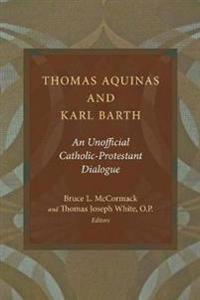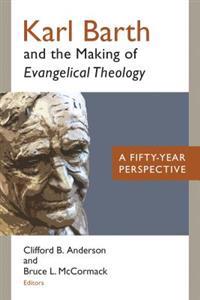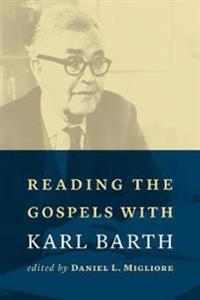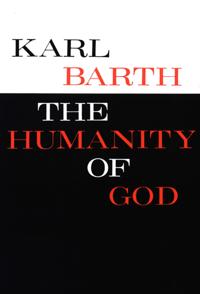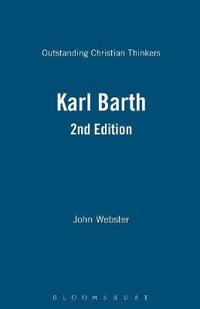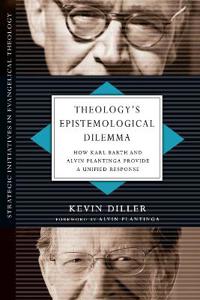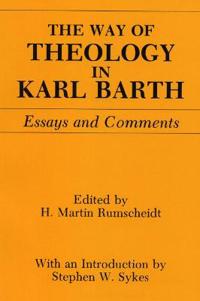God Here and Now (Häftad)
avKarl Barth
ISBN: 9780415304474 - UTGIVEN: 200302Karl Barth was, without doubt, one of the most significant religious thinkers of modern times. His radical affirmation of the revealed truth of Christianity changed the course of Christian theology in the twentieth century and is a source of inspiration for countless believers. Pope Pius XII declare[...]
The Cambridge Companion to Karl Barth (Häftad)
ISBN: 9780521585606 - UTGIVEN: 200010This authoritative book introducing Karl Barth is written by leading scholars of his work, drawn from Europe and North America. They offer challenging yet accessible accounts of the major features of Barthâs theological work, especially as it has become available through the publication of his [...]
Church Dogmatics (Pocket)
avKarl Barth, G. W. (EDT) Bromiley, T. F. (EDT) Torrance
ISBN: 9780567022790 - UTGIVEN: 2009-04The most important theological work of the 20th century in a new edition! Karl Barth's Church Dogmatics is one of the major theological works of the 20th century. The Swiss-German theologian Karl Barth (1886-1968) was the most original and significant Reformed theologian of the twentieth century. He[...]
God's Being in Reconciliation: The Theological Basis of the Unity and Diversity of the Atonement in the Theology of Karl Barth (Pocket)
avAdam J. Johnson
ISBN: 9780567123459 - UTGIVEN: 2013-11-07Karl Barth's Church Dogmatics (Pocket)
avR. Michael Allen
ISBN: 9780567152190 - UTGIVEN: 2012-05This is a textbook with annotated excerpts from Karl Barth's "Church Dogmatics" and additional essays on Barth's life and work and his place in modern theology. This reader from Karl Barth's multi-volume "Church Dogmatics" offers an introduction to the whole work, key readings in reasonable portions[...]
Karl Barth and the Analogia Entis (Pocket)
avKeith L. Johnson
ISBN: 9780567344632 - UTGIVEN: 2011-12Many interpreters argue that Karl Barth's rejection of the Roman Catholic analogia entis was based upon a mistaken interpretation of the principle, and many scholars also contend that late in his career, Barth changed his mind about the analogia entis, either by withdrawing his rejection of it or by[...]
Church Dogmatics, Volume 24 (Häftad)
avKarl Barth
ISBN: 9780567508843 - UTGIVEN: 201007Karl Barth's Church Dogmatics is one of the major theological works of the 20th century. The Swiss-German theologian Karl Barth (1886-1968) was the most original and significant Reformed theologian of the twentieth century. Barth began the Church Dogmatics in 1932 and continued working on its thirte[...]
Karl Barth, Catholic Renewal and Vatican II (Pocket)
avBenjamin Dahlke
ISBN: 9780567616869 - UTGIVEN: 2013-11-07Karl Barth's Theology as a Resource for a Christian Theology of Religions (Inbunden)
avSven Ensminger
ISBN: 9780567655769 - UTGIVEN: 2014-09This book uses Karl Barth's theology as a resource for Christian theology of religions. For this purpose, it examines Barth's theology under the doctrinal aspects of revelation, revelation and religion, theological anthropology and election, addressing questions such as the possibility of and contex[...]
Karl Barth (Häftad)
avJoseph L Mangina
ISBN: 9780664228934 - UTGIVEN: 200411The thought of Karl Barth has undergone a remarkable renewal of interest in recent decades. Joseph Mangina's Karl Barth: Theologian of Christian Witness offers a concise, accessible guide to this important Christian thinker. Unique among introductions to Barth, it also highlights his significance fo[...]
Insights (Pocket)
avKarl Barth, Eberhard Busch, O. C., Jr. Dean
ISBN: 9780664232399 - UTGIVEN: 200902This collection of short passages from the writings of Karl Barth reflects on the life of Christian faith. These one-page selections capture the vibrancy of Barth's faith, communicating his sense of wonder and excitement. Each piece is related to a verse of Scripture, making this an ideal book for d[...]
The Early Preaching of Karl Barth
ISBN: 9780664233679 - UTGIVEN: 2009-09Westminster John Knox Press is proud to present this special collection of fourteen of Karl Barth's World War I-era sermons--the only English language collection of Barth's sermons preached between 1917 and 1920 when he was a parish pastor in Safenwil, Switzerland. This volume offers a fascinating g[...]
The German Church Conflict (Pocket)
avKarl Barth
ISBN: 9780718891756 - UTGIVEN: 2008-04What happens when a government decides to nationalise Christianity? There have been infinite examples in pre-modern times, but a very significant one shaked our entire world not so long ago: the foundation of the German-Christian Church by Hitler. Karl Barth essays, written between 1933 and 1939, of[...]
Karl Barth: An Introductory Biography for Evangelicals (häftad)
ISBN: 9780802869395 - UTGIVEN: 2017-09Karl Barth has long been an object of both suspicion and curiosity for evangelical Christians. Those who do want to know more about Barth often find themselves daunted by the sheer volume of his massive output, unsure of where to start or how to engage with the famously prolific theologian.
[...]Thomas Aquinas and Karl Barth (Häftad)
avBruce L. McCormack
ISBN: 9780802869760 - UTGIVEN: 2013-08Thomas Aquinas and Karl Barth are often taken to be two of the greatest theologians in the Christian tradition. This book undertakes a systematic comparison of them through the lens of five key topics: (1) the being of God, (2) Trinity, (3) Christology, (4) grace and justification, and (5) covenant [...]
Karl Barth and the Making of Evangelical Theology (Häftad)
ISBN: 9780802872357 - UTGIVEN: 2015-02Swiss theologian Karl Barth traveled to the United States only once during his long career. In 1962, newly retired, he came to visit family and to deliver a series of lectures subsequently published (by Eerdmans) as "Evangelical Theology: An Introduction, " which remains in print and widely read to [...]
Reading the Gospels with Karl Barth (häftad)
ISBN: 9780802873637 - UTGIVEN: 2017-04In the course of his multivolume Church Dogmatics, Karl Barth not only cites thousands of Scripture texts but also offers extensive exegetical discussion of numerous passages. In this volume twelve leading theologians and biblical scholars explore Barth's exegesis of particular passages in the Gospe[...]
The Humanity of God (Häftad)
avKarl Barth
ISBN: 9780804206129 - UTGIVEN: 1999-12Karl Barth is generally regared as the greatest Protestant thinker of modern times. The three essays in this book, "The Humanity of God," "Evangelical Theology in the 19th Century," and "The Gift of Freedom," show how Barth's later work moved beyond his revolt against the theology dominant in the fi[...]
Karl Barth (Häftad)
avJohn Webster
ISBN: 9780826474636 - UTGIVEN: 2004-05Karl Barth (1886-1968) has been called the most important Protestant theologian since Schleiermacher. A lifetime of work produced a huge and complex body of writings that emerged from both his theological teaching and from his engagement in church life. The publication of some of his work posthumous[...]
Theology's Epistemological Dilemma: How Karl Barth and Alvin Plantinga Provide a Unified Response (Häftad)
avKevin Diller
ISBN: 9780830839063 - UTGIVEN: 2014-12The problem of faith and reason is as old as Christianity itself. Today's philosophical, scientific and historical challenges make the epistemic problem inescapable for believers. Can faith justify its claims? Does faith give us confidence in the truth? Is believing with certainty a virtue or a vice[...]
The Theology of Karl Barth (Häftad)
avHans Urs Von Balthasar
ISBN: 9780898703986 - UTGIVEN: 1992-10

